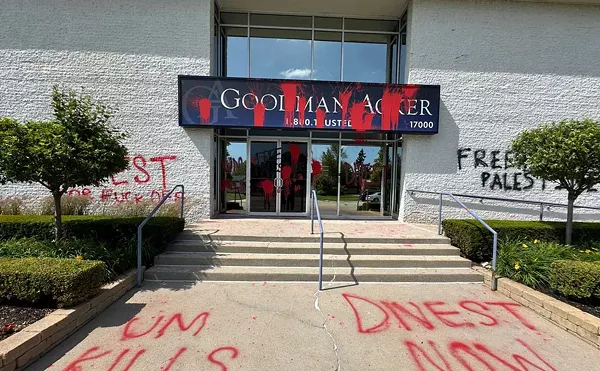
Audio By Carbonatix
[
{
"name": "GPT - Leaderboard - Inline - Content",
"component": "35519556",
"insertPoint": "5th",
"startingPoint": "3",
"requiredCountToDisplay": "3",
"maxInsertions": 100,
"adList": [
{
"adPreset": "LeaderboardInline"
}
]
}
]
While routinely monitoring Detroit-oriented online discussion groups last week to get a taste of what people are talking about, I found a link to something that stopped me cold.
It was part of a discussion string labeled “God’s City” on Lowell Boileau’s excellent Web site, DetroitYES.com. The link took me to the City of Detroit’s economic development home page and Mayor Kwame Kilpatrick’s greeting there, where he writes:
“Detroit, God’s City is now engaged in one of urban America’s greatest revitalization efforts.”
At first I took it as yet another cynical, politically motivated, Bible-thumping ploy to regain the support of the city’s churchgoing electorate, who three years ago placed so much faith in Kilpatrick as a moral, God-fearing family man and the kind of new, young blood that the city’s entrenched, Machiavellian and ultimately self-defeating political system needed. He has a lot of explaining to do to them and all Detroit voters, and so far has been a farcical failure at it.
Then I remembered another “City of God,” not St. Augustine’s fifth century polemic on converting a profligate, degenerate Rome to Christianity, but a notorious slum in Rio de Janeiro, subject of a 2002 Oscar-nominated film of the same name.
Cidade de Deus, as it’s called in Portuguese, is a ’60s era housing project that was promoted as a revitalization effort to serve Rio’s black poor, but was reportedly intended to contain those people away from the view of tourists who had enriched the city and given its leaders international bragging rights.
Construction was never completed, the city failed to provide even the most basic services, young crime lords took over, and it soon became so vile and violent a place that even cops balked at going there.
Writer Marcio Siwi, in a review for the Council on Foreign Relations in D.C., said, “Perhaps naming the housing project City of God made it easier for the authorities to justify their lack of attention to it and their failure to engage its residents; God, after all, was taking care of it.”
Another reviewer, writing for the HBCU (Historically Black Colleges and Universities) Web site, described Rio’s City of God this way:
“Life as a resident in the Cities (sic) of God is often glamorized by things like luxury vehicles, spinner rims, gold fronts (teeth), how many women are bedded, prison stints, weed, ice (platinum) jewelry, run-ins with the law, and any variety of local and/or regional standards of conduct.”
And a third reviewer proposed that the film is “a wake up call for most Brazilians who live in a country where many people, especially people of color, live in poverty and face this reality everyday.”
So back to Detroit — God’s City, as its inept, disappointing, self-reverential mayor apparently would like us to call it. At best, if we’re to bite on this sucker play, it needs an appropriate tagline, something like, “Why hast thou forsaken me?”
Or maybe Kwame Kilpatrick inadvertently came upon a nickname that perfectly suits the Detroit he governs today, one that echoes the slums of Rio with their violence, corruption and official neglect, places where lights don’t light, trash and filth cover the streets, and undereducated, underserved children in shocking numbers die by the gun. All this, while their powerful, monied neighbors pretend either that such a world doesn’t exist on the other side of their backyard fence, or that it doesn’t affect them if it does.
So let this be of comfort when you fear for the future of Detroit. Kwame Kilpatrick has let us know that God, after all, is taking care of it.
Send comments to rbohy@metrotimes.com




